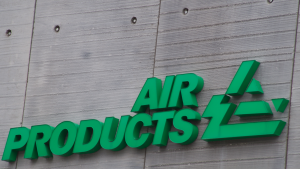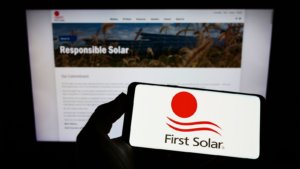After all, Tesla shares had just hit an all-time high of $414.50 and looked like they would keep increasing. In hindsight, we know that didn’t happen. Thirteen months later, they were trading at $101.81. Fortunately, the share price for long-time shareholders recovered some of those losses in 2023. Since mid-December, Tesla stock has once again fallen on hard times.
That begs the question: Is Tesla one of the three worst-performing S&P 500 stocks to buy before they rebound?
Based on my selection criteria €”S&P 500 stocks in the bottom 103 by performance with a positive 5-year return €”Tesla should make the list. However, I’ve chosen these other three instead.
Air Products and Chemicals (APD)

Air Products and Chemicals (NYSE:APD) is down 19.61% through Feb. 9 and up 26.29% over the past five years.
First, let’s consider why its shares are down so much and what it needs to do to get itself back in investors’ good graces.
On Feb. 5, APD stock fell more than 15% after the company revised its guidance much lower. It expects fiscal 2024 earnings per share of $12.35 at the midpoint of its guidance. That’s down from $12.95 previously. It’s also 62 cents below the FactSet analyst estimate.
In addition to lower guidance, it reported Q1 2024 earnings of $2.82 per share. That missed the consensus estimate by 18 cents. On the top line, its revenue was $3 billion, $200 million short of the consensus.
The causes of the shortfall in the quarter included a slowdown in Manufacturing activity in China and other parts of Asia. The producers of industrial gases make money by supplying these companies with oxygen, hydrogen, helium and other gases. When activity slows, demand for its products also slows.
The loss on Feb. 5 was its worst single-day performance since Oct. 19, 1987, when it lost 21.5%.
Buy the dip, says the contrarian investor.
First Solar (FSLR)

First Solar (NASDAQ:FSLR) is down 12.0% through Feb. 9 and up 208.05% over the past five years.
There’s no mystery why its shares are down year-to-date. Solar stocks have performed miserably since September. However, analysts buy the bigger picture. Of the 32 analysts covering its stock, 81% rate it a Buy, with a $226 target price, 49% higher than where it’s currently trading.
In December, Barron’s reported that Morgan Stanley analyst Andrew Percoco believed the stock could bounce back. While it’s up about seven dollars from the Dec. 8 article, it remains down for 2024.
Percoco upgraded its stock from Equal Weight to Overweight, increasing its price target by $23 to $237, $11 higher than the median target.
“We estimate the company will generate $13 billion of free cash flow through 2032 just from IRA tax credits alone, which will provide the company with significant excess cash for technology R&D [research and development], M&A [mergers and acquisitions], or capital return,” Barron’s reported Percoco’s comments.
Two things can help businesses improve for First Solar. First, interest rates could fall, and second, more of the money from the Inflation Reduction Act gets put to work to help the green energy industry.
FSLR trades at just 11.5x the 2024 EPS estimate of $13.27.
Extra Space Storage (EXR)

Extra Space Storage (NYSE:EXR) is down 12.79% through Feb. 9 and up 43.78% over the past five years. Self-storage stocks like EXR are affected by higher interest rates.
Why?
Because they borrow to buy land to put storage facilities on, the REIT’s (real estate investment trust) competitors are all having a tough start to 2024. Public Storage (NYSE:PSA) is the biggest self-storage REIT. Its shares are down 8.90% YTD. CubeSmart (NYSE:CUBE), which is considerably smaller, is down 7.96%.
The best part about owning self-storage REITs is that over time, self-storage locations considered on the outskirts of a major city when first developed become surrounded by other properties, raising the value of the real estate while still generating income from storage rentals, etc.
From that perspective, self-storage REITs are an excellent long-term investment.
Why EXR?
First, its properties are all in the U.S. The U.S. remains the best self-storage market anywhere on the planet, with a little more than one billion square feet as of 2023, with 14% built in the past five years.
Despite being solely in the U.S., Extra has just a 13.7% market share in the U.S. Once interest rates come down, it will return to making acquisitions.
Its most recent was a biggie, buying Life Storage for $11.5 billion in stock. The combination gives Extra two strong brands with a presence in 42 states with 3,651 locations and 279 million rentable square feet.
Based on its quarterly dividend of $1.62 a share, it yields a healthy 4.5%. Over the past 10 years, it’s grown by 548%. Get paid to wait for the next leg higher.
On the date of publication, Will Ashworth did not have (either directly or indirectly) any positions in the securities mentioned in this article. The opinions expressed in this article are those of the writer, subject to the InvestorPlace.com Publishing Guidelines.
Will Ashworth has written about investments full-time since 2008. Publications where he’s appeared include InvestorPlace, The Motley Fool Canada, Investopedia, Kiplinger, and several others in both the U.S. and Canada. He particularly enjoys creating model portfolios that stand the test of time. He lives in Halifax, Nova Scotia.
